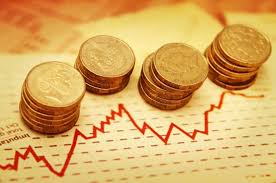The Merriam-Webster dictionary defines a stock as the subscribed capital of a corporation or limited liability company, usually divided into shares and represented by transferable certificates. The stocks which are placed in the stock markets are basically pieces of publicly traded company’s. When a company is trading publicly, then anyone can buy into it, becoming a part owner of the company, thus becoming what we call a shareholder. As a shareholder, you are the partial owner of the company and have a set of rights, know as the shareholder rights. According to Investopedia, those rights include voting powers on major issues, ownership in a portion of the company, the right to transfer ownership, an entitlement to dividends, the opportunity to invest corporate books and records and the right to sue for wrongful acts. Something interesting to look at is that the larger amounts of shares a shareholder owns, the more influence he or she has within the company. So they have a greater say in the decision-making process. Shareholders also attend shareholder meetings where key decision are made.
Making money is the reason why anyone would invest in the stocks in the first place. So, how is money made with a stock? There are actually two main ways this happens. The first is what we call capital gains. This term is not only used in the stock markets but also in the bond and real estate markets. Capital gain occurs whenever the price of the underlying stock increases in value from the original purchase price. For example, Mr. Joseph buys 10 shares in Boeing which has a current stock price of $100/share. So, the purchase price of 10 shares for him would be $1,000. One month later, Mr. Joseph checks back on his investment and finds that Boeing stock price is now at $130 a share. So, Mr. Joseph decided to sell his shares. Since, the stock price has increased by 30%, he made a $300 profit from it. That $300 profit is what we would call capital gain. There can be the opposite scenario as well. We would call that capital loss. In that case the stock price would have fallen. Something important to know is that the gain is not realised until he stock is sold. Like everything, when you make capital gains, you have to pay what we call capital gains tax. This tax varies from country to country. Obviously, if capital loss occurs, then you are exempted from paying the tax.
The second way of making money with the stock markets is through dividends. How to define it? As per the Merriam- Webster dictionary, a dividend is an amount of the company’s profits that the company pays to people who own stock. The process of distributing dividends by a company is decided by its board of directors. The board will always use dividend distribution at times of profit in order to attract and keep in investors. It can also be interpreted as a statement which says- ‘We are a strong company’. The dividend is often called the DPS (Dividend per share). It can also be quoted in terms of percentage, i.e, dividend yield %. In many cases, the more stable a company is, the more dividends it will offer in order to counteract its low price action movement, i.e., how much it moves up or down. On the other hand, a higher growth company will rarely distribute dividends so that the capital can be re-invested in the company to continue its high growth. Lets take an example. Mr. Joseph is in search of another investment after his successful Boeing investment. A friend who is an investment banker gives him two picks- AT&T or Facebook. AT&T offers what we would call a fat 6% Dividend yield. Facebook doesn’t offer any dividend yield. On the other hand, Facebook is projected to grow 30% in the coming year while AT&T is not projected to show any growth in the coming year. Mr. Joseph faces a tough decision. Facebook’s projections say that it would increase 30%. But those are only projections. Nothing is for sure. Facebook can even fall down by 30% in the coming year. AT&T provides assured 6% of the stock price as dividend. In this case, what is believed in the investment community is that an older person should invest in the more secured investment while a younger person has the time to risk the capital and take the chance.
In any case, both capital gains and dividends depend on the fortune of the company. Dividends are a result of the company’s earnings while capital gains are the result of the investor demand for the stock.
Click here for government certification in Accounting, Banking & Finance





8 Comments. Leave new
Good work!
Very briefly explained and analysed..good job
Good one. Very well presented article.
Great job! The blog is really informative and well written.
Well written and informative
Good effort…!
Well presented.
Topic well analyzed..Nice